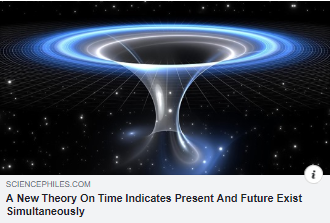Time: Future and Past Exist Simultaneously

One thing that people from all disciplines seem to be lining up behind, however, is that the forward progression of time is an illusion. In terms of science, this began, of course, with Einstein and his work on special relativity. This immediately and forever replaced Isaac Newton’s view of the universe, which was one of four dimensions that are absolute and universal: three of space and one of time. He believed that the entire universe existed in one large coordinate system, independent of human involvement.
Einstein may have been the first to blow this notion apart, but he certainly wasn’t the last. Recently, we had Steven Hawking and his Brief History of Time, and now the discovery presented here.
But science is just one way of looking at things. In parallel to all this, a great deal of western philosophy developed that focuses on explaining time in other ways that we also find counter-intuitive. The ancient Greeks, for instance, had two words for time: chronos and kairos. The former refers to the chronological or sequential time that we use in our daily lives, while the latter is sometimes translated as “God’s time,” which has a spiritual and permanent nature.
Two thousand years later, Immanuel Kant wrote that time (and space) were merely “forms of our intuition.” In other words, they don’t exist outside our minds; we need to impose them on the external world in order for us to make any sense of things.
French metaphysician Henri Bergson, supported the idea that time is mind-dependent since he suggested that real time, which he called “duration,” exists merely in our consciousness.
Eastern religions/philosophies join in all this , and uniformly deny that time exists independent of our minds. From ScienceDirect:
According to Buddhist Philosophy, time appears in our consciousness during the process of knowing, which consists of the existence of matter first, then, the interaction between matter, then, functions of our consciousness (our senses), then, the process of knowing that occur in our consciousness and finally, the feeling that occurs in our consciousness. Time therefore, is subjective because its existence depends upon our consciousness to acknowledge it. Time is relative to our consciousness through our perceptions of the world via our senses. Moreover, Buddhist philosophy suggests that time does not have real existence. It is only a concept with no inherent existence because it belongs to the relative truth of the world of experience from our consciousness.
Perhaps the most noteworthy aspect of all this is the broad agreement of all these completely different ways of understanding a thorny subject. I challenge the reader to name another example of human thought in which science and all religions agree simultaneously.
